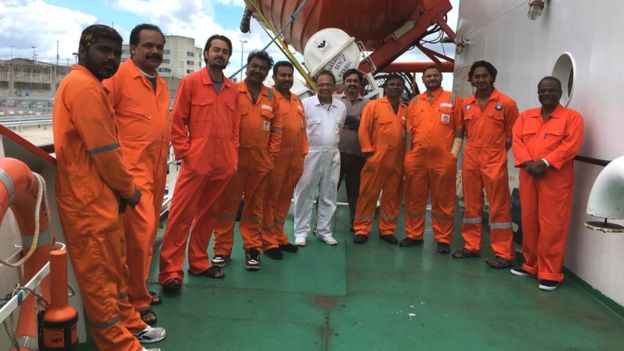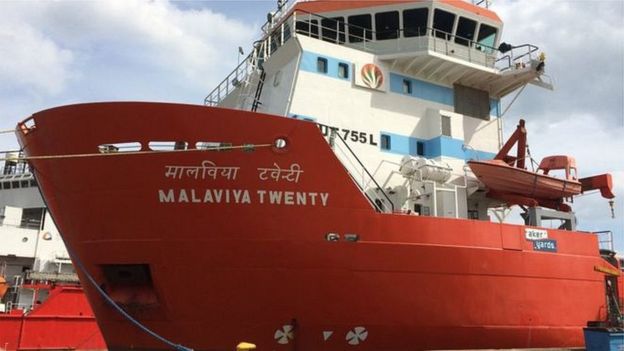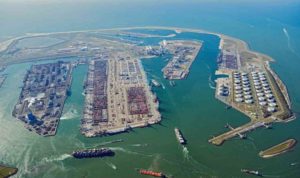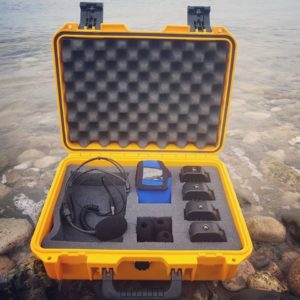Abandoned seafarers: hungry, penniless and far from home

According to International Labour Organization (ILO) figures, there are more than 160 active cases of vessel abandonment around the world, where crews are waiting to be paid and ships are stranded or detained.
Since January 2017, the ILO’s Maritime Labour Convention has required ship owners to have financial protection in place for crews in the event of abandonment, death or disability, and any ships entering ports in the 96 states where the convention is in force must provide evidence of their compliance, writes Roz Tappenden for the BBC.
The rule, which guarantees four months’ wages, was devised because of abandoned sailors’ reluctance to leave their ships until they had been paid.
Brandt Wagner, Head of the ILO’s Transport and Maritime Unit, says that although most providers of financial security, usually insurers, act quickly to meet their obligations, some do not. He says this slows down the process of repatriation and payment, and sometimes states needed to be encouraged to intervene.
Brandt says there had been an increase in cases of abandonment since the rules came into force, but it was not clear whether this was simply due to more cases being reported than had been the case. In any event, the rules meant fewer seafarers were abandoned for long periods.

Long-term abandonment is very rare in the UK but, in June 2016, England’s east coast port of Great Yarmouth became the unexpected home of the crew of the Indian-registered Malaviya Twenty when it was impounded over unpaid port fees and wages.
Inspections revealed defects resulting in a prohibition notice being placed on the ship. It was eventually forcibly auctioned by the Admiralty Marshal.
While stranded, the 12 crew members were fed by local people and grew vegetables on the ship’s deck. A replacement crew from India joined the ship in February 2017 and remained on board until September 2018 when it was bought by a Greek firm and released.
The Malaviya Twenty‘s sister ship, Malaviya Seven, was also sold in 2017 after being held for more than a year in Aberdeen. The crew of that ship remained on board to ensure they would be paid.
When a ship bound for east Africa was detained in Portland off the south coast of England in November, its Russian crew feared they would be stranded indefinitely but their ordeal was much more short-lived.
When their vessel, the MV Jireh, was detained by UK authorities for failing to meet safety and welfare standards, the Sailors’ Society (a Southampton-based organisation) stepped in to help, supplying food, a phone and a birthday cake for the captain.
And, although the ship remains under detention, by Christmas Eve the men had all been paid and were on their way home.
Hundreds of other seafarers have been stuck on their vessels, some for years, when their ships’ owners have run out of money. Sailors who leave their ships in these circumstances risk never being paid and so feel they have to stay put.
With no income, dwindling supplies and no employer, those stuck in this predicament often rely on the kindness of strangers and the help of charities.
In 2017, 40 Indian seafarers aboard a flotilla of merchant ships who had been hired to transport crude oil from the UAE to Iraq were left stranded in waters just off Dubai because of a financial dispute involving the vessels’ owner, according to the BBC.
The shipping company failed to secure permission for them to enter port and, before long, life on board became unbearable. Desperate sailors began tweeting about the conditions. They were hungry and in poor physical and mental health, and all the while, bailing out seawater from their leaking vessels.
The situation on board was “tense” with fighting, hunger, isolation and the intense heat all taking their toll.
“Every second on the clock felt like a year,” says Rajesh Goli, a captain on one of the vessels. “We used to catch fish from morning to evening.” He spent 11 months stranded within sight of Dubai. “There was no other option for us to survive.”
Initially, the men were able to eat three meals a day but for the final seven months there was only enough food to eat once. They filtered rainwater through a cloth, but the unpleasant smell made it difficult to drink.
“Everyone on board was sick, sometimes we only ate once every two days,” Capt Goli says. “That affected our health a lot, everyone just dropped weight.”
After an ordeal lasting almost a year, the sailors were eventually able to return to India.
The Sailors Society Chief Operating Officer, Sandra Welch, says ships are typically abandoned when the owners run out of money to pay the crew or run the ship.
“In many cases, the ship itself is in poor condition, the owner can’t – or won’t – invest the money needed to repair it and the situation spirals out of control,” she says.
She says that even if the owner or a charity offered to repatriate them, sailors often choose to stay until their wages are paid as they are afraid that if they leave the ship, they will lose any claims they have on their salaries.
One such vessel is the offshore supply ship PSD2, which has been anchored off the east coast of South Africa since 2015.
Two men, including the captain, have not been paid for nearly five years but remain on board in the hope that one day they will be. Read the full article on the BBC.










